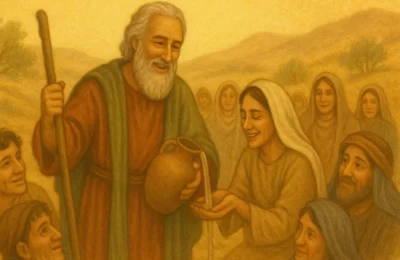Live it out. Share the truth. Walk with courage.
Foundations of a Biblical Worldview – Part 3
Scripture: Romans 5:12
Introduction: What’s Wrong with the World?
Francis Schaeffer once observed that the modern world is not merely confused—it’s severed from reality itself. “Truth is no longer something which corresponds to reality as it is,” he warned, “but something which each individual creates for himself.”
This disconnection isn’t just philosophical—it’s deeply personal. It touches every area of life: pain, injustice, corruption, war, death. We know something is wrong. But what?
The biblical answer is stunningly clear: the Fall. Genesis 3 is not a myth—it’s the tragic origin story of sin, suffering, and separation. It’s why the world feels off-center and why every attempt to fix it apart from God ultimately fails.
As C.S. Lewis famously put it in Mere Christianity:
“If the whole universe has no meaning, we should never have found out that it has no meaning… A man does not call a line crooked unless he has some idea of a straight line.”
The Fall matters—because Creation matters. Without a Creator, brokenness isn’t a tragedy; it’s just nature. But if God made us in His image, then our rebellion has cosmic consequences—and points to our desperate need for redemption.
The Fall in Romans 5:12
Romans 5:12 summarizes the gravity of Genesis 3:
“Therefore, just as through one man sin entered into the world, and death through sin, so death spread to all mankind, because all sinned.”
Here, Paul doesn’t treat Adam as a metaphor—he treats him as historical. Sin is not just bad behavior; it’s a spiritual condition inherited from Adam, infecting all humanity with guilt and death. The Greek term eisēlthen (“entered into”) emphasizes a decisive moment when sin invaded God’s perfect creation.
The Fall didn’t just damage Adam and Eve. It unleashed a chain reaction:
- Sin entered.
- Death followed.
- Every human soul was affected.
This isn’t a fable—it’s forensic reality. Theologically, it’s the foundation for why we need a Savior. Without Adam’s sin, there would be no need for Christ’s cross. Paul’s logic is clear: if one man’s sin brought death, then only one man’s righteousness can bring life (Romans 5:17–19).
Why the World Feels Broken
Modern culture rejects the Fall because it rejects moral accountability. But the symptoms of sin are everywhere:
- Relationships fracture.
- Justice feels elusive.
- Nature groans.
- Death feels unnatural.
Atheistic naturalism says these are evolutionary leftovers. Richard Dawkins insists that the universe exhibits “no design, no purpose, no evil, no good, nothing but pitiless indifference.” But try telling that to someone holding a child’s funeral.
We intuitively know better. The universal human cry for justice, meaning, and hope points back to a moral order we’ve violated. Genesis 3 explains not only what happened—but why our hearts still long for something more.
The Fall diagnoses our condition. It explains why every political solution, every self-help method, and every secular utopia crumbles. We don’t need better systems—we need a new heart.
Sin, Shame, and Spiritual Formation
Genesis 3 reveals more than humanity’s disobedience—it exposes our deepest fears:
- Guilt: “I was afraid because I was naked” (v. 10).
- Shame: They hid from God (v. 8).
- Blame: Adam blames Eve. Eve blames the serpent (v. 12–13).
These same patterns haunt our spiritual lives today.
True discipleship begins when we stop hiding and start confessing. As John reminds us:
“If we say that we have no sin, we are deceiving ourselves… If we confess our sins, He is faithful and righteous to forgive” (1 John 1:8–9).
Understanding the Fall is essential for understanding grace. You cannot grasp the cross without Genesis 3. And you cannot grow in Christ without confronting your need for Him daily.
Confront Sin with Truth
Don’t sugarcoat sin. Don’t redefine brokenness as identity. Don’t downplay humanity’s rebellion.
Instead:
- Acknowledge sin’s reality in your own heart.
- Help others understand that our world is broken not by chance—but by choice.
- Proclaim the gospel as the only remedy for sin’s curse.
Our culture needs clarity. It needs courage. It needs Christians who are not afraid to name the problem—and point to the Savior.
← Previous: In the Beginning: Why Creation Matters Today
Next → Grace and Truth: How Jesus Engaged Hard Issues
View all: Foundations of a Biblical Worldview Series
Key Takeaways
- The Fall explains why the world feels broken—because it is.
- Sin is not an illusion or a myth; it’s humanity’s inherited condition.
- We cannot understand redemption without understanding rebellion.








